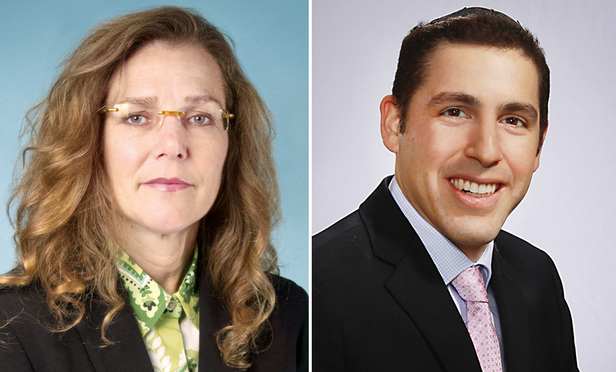Dorothy R Auth

March 25, 2022 | New York Law Journal
Protecting Company Intellectual Property in Today's Work From Home EconomyWith current work practices shifting toward remote working, and the focus of technology development moving increasingly toward computer software, the likelihood is increasing that employees may be developing valuable intellectual property rights away from their employers' offices and using their own resources.
By Dorothy R. Auth, Howard Wizenfeld and David (Dash) Cole
8 minute read

September 14, 2020 | New York Law Journal
Patent Issues Highlight Risks of Moderna's COVID-19 VaccineModerna's COVID-19 vaccine represents one of our best hopes for overcoming the pandemic; however, several unresolved patent issues are brewing in the background, underlying the substantial risks and significant potential rewards of Moderna's vaccine.
By Dorothy R. Auth and Michael B. Powell
8 minute read

November 07, 2016 | New York Law Journal
Patents for Computer and Life Science Technologies Making a Comeback?Dorothy Auth and Howard Wizenfeld of Cadwalader, Wickersham & Taft examine two recent Federal Circuit cases regarding patent eligibility for computer- and life-science- related technologies. Many district court judges have dismissed cases based on patent ineligibility even before the claim language has been construed or any facts considered. Similarly, life science patents have been held invalid as covering laws of nature or natural phenomena. The recent decisions provide clues on how to draft claims that can survive a §101 challenge thereby allowing stakeholders to obtain and enforce patent claims that comport with the Supreme Court's jurisprudence under §101.
By Dorothy R. Auth and Howard Wizenfeld
20 minute read
August 18, 2008 | National Law Journal
Inter partes re-examination: What lies ahead?Back in 1999, Congress thought it would apply Swiss mathematician Daniel Bernoulli's theorem in hydrodynamics to the logjam of patent suits that were clogging the courts. It seemed like a good idea — increasing the velocity of cases and reducing the pressure on the court system by instituting an alternative channel for many of these court cases — but to date its effectiveness has not been realized. A recent court decision and proposed patent legislation may breathe life into the provision by extending its breadth.
By Dorothy R. Auth, Andrew C. Chien and John Peter Halski / Special to The National Law Journal
12 minute read

October 11, 2012 | New York Law Journal
Final Patent Rules Quell Jitters Over Post-Grant ProceedingsIn her Patent Proceedings column, Dorothy R. Auth, partner at Cadwalader Wickersham & Taft, writes that the America Invents Act and the Patent and Trademark Office's final rules attempt to prevent overlap between the two new proceedings and district court civil actions to prevent multiple attacks by a patent challenger in different tribunals.
By Dorothy R. Auth
13 minute read
July 26, 2013 | New York Law Journal
'Myriad' Aftermath: What Remains Patent Eligible?Cadwalader, Wickersham & Taft partner Dorothy R. Auth writes: The Supreme Court's recent holding sent shock waves throughout the biotech IP community not only because the court invalidated a class of commonly issued patent claims, but also because it established a bright-line distinction between naturally and non-naturally occurring compounds. However, a calmer reading of 'Myriad' reveals that its reach may be more limited than first reported.
By Dorothy R. Auth
7 minute read

November 02, 2009 | Corporate Counsel
Ins and Outs of Global Patent StrategyBecause the core technology of a good idea is critical to a company's future, it must be vigorously protected at inception. Entrepreneurs need to grasp the basics of how patent protection works and select which "great" idea to use first in building a company from the ground up.
By Dorothy R. Auth, Andrew C. Chien and Jason M. Rockman
14 minute read
September 14, 2011 | New York Law Journal
Congressional Breakthrough On Patent Reform Likely This FallDorothy R. Auth and Andrew C. Chien of Cadwalader, Wickersham & Taft discuss the "America Invents Act," a patent reform bill which, if signed into law, will replace the current first-to-invent system with a first-to-file regime, mandate a new patent filing grace period, and create a new post-grant review scheme permitting administrative, extra-judicial challenges to an issued patent.
By Dorothy R. Auth and Andrew C. Chien
13 minute read
October 26, 2009 | New York Law Journal
Global Patent StrategyDorothy R. Auth, a partner at Cadwalader, Wickersham & Taft, and Andrew C. Chien and Jason M. Rockman, associates at the firm, write: While most entrepreneurs have dozens of "great" ideas for starting companies, in actual practice most companies are started by picking a single good idea that can be grown into a successful product. If all goes well, this initial idea provides the financial wherewithal that enables the company to take more of these ideas and nurture them into products. Because the core technology of an initial good idea is so critical to the company's future viability, it must be vigorously protected from the outset.
By Dorothy R. Auth, Andrew C. Chien and Jason M. Rockman
14 minute read
Trending Stories
- 1Tuesday Newspaper
- 2Judicial Ethics Opinion 24-85
- 3Decision of the Day: Administrative Court Finds Prevailing Wage Law Applies to Workers Who Cleaned NYC Subways During Pandemic
- 4Trailblazing Broward Judge Retires; Legacy Includes Bush v. Gore
- 5Federal Judge Named in Lawsuit Over Underage Drinking Party at His California Home
More from ALM
- Scan In Progress: Litigators Leverage AI to Screen Prospective Jurors 1 minute read
- Legal Speak at General Counsel Conference East 2024: Match Group's Katie Dugan & Herrick's Carol Goodman 1 minute read
- Legal Speak at General Counsel Conference East 2024: Eric Wall, Executive VP, Syllo 1 minute read



